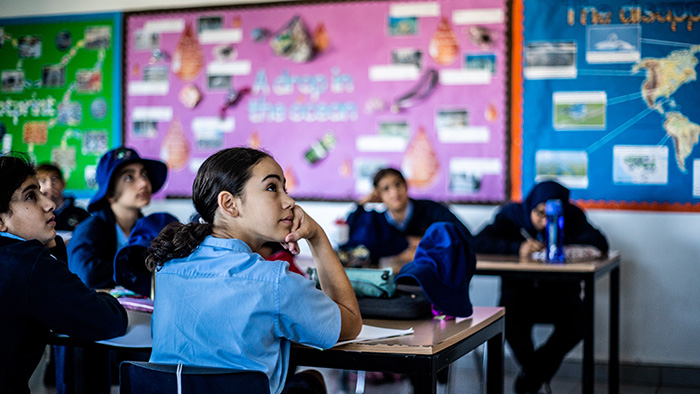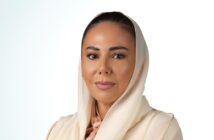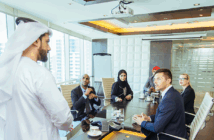BY DQ LIVING STAFF
In February 2020, in line with their strategy to position the British International School Riyadh (BISR) as the leading educational provider in the Kingdom of Saudi Arabia and a beacon of British International School, BISR signed a contract with the Diplomatic Quarter General Authority (DQGA) to open their third campus in Riyadh.
This new campus within the Diplomatic Quarter will operate in addition to their Al Hamra campus, which is the educational home for 1345 students, as well as BISR satellite Primary School at Salwa Garden Village, that provides education for 150 students. The new DQ campus will support the significant demand and long waiting lists for British International School places within Riyadh.
In a short space of time BISR has established a strong working relationship with the DQGA. These two organizations are delighted to be able to contribute to Vision 2030 through opening a new International School. BISR has a strong 40-year track record of providing high quality education to expatriate students in Riyadh. The launch of the DQ campus is a momentous new chapter in the history of the school.
DQ Magazine had a great opportunity to have a discussion with Principal Helen Olds.
When and how did the idea of opening British International School in the Diplomatic Quarter originate? What were the challenges that were initially faced?
The opportunity to open a third campus in Riyadh presented itself in mid-December 2019, when the British International School Riyadh (BISR) was made aware that the Diplomatic Quarter General Authority (DQGA) had ambitions to open an International School and were looking for a school to partner with. We felt we were well placed to take on this challenge, having already established a multi-campus model, understanding the international market in Riyadh and having a strong track record of education provision within the Kingdom over the last 40 years.
Challenges throughout this period have centered around time. It only took us seven weeks from first viewing the site to signing the contract with the DQGA, impressively quick for the scope of the project. Since signing the contract, we have been placing resource orders, organizing renovation of the existing campus and recruiting teachers. I am delighted to inform you that recruitment of high-quality teachers is now complete, resources are now ordered and renovation is well underway. All this has been made possible due to the strong partnership we have developed with the DQGA and support from a talented team of individuals who have mobilized for this work.
Who can attend BISR and what are the advantages? What are the requirements for admission at the Diplomatic Quarter campus?
Students of any nationality can attend BISR and we are proud to offer education to students from over 50 different nationalities. Initial priority is given to British and Dutch families living in or near to the Diplomatic Quarter, with priority then given to children of other nationalities. Due to license restrictions we are limited in the number of Saudi Arabian students we can accept. To be able to access the curriculum, students need to meet a minimum English Language level, but for the 2021-2022 academic year we hope to open an intensive language program to a small number of students to broaden the range of nationalities and students we can cater for.

There are enormous advantages of a British education and attending the British International School Riyadh, including the following:
- A British education is respected worldwide.
- BISR is an academically successful school with proven examination success at IGCSE and A-level.
- We enjoy high levels of parent satisfaction.
- We offer a broad co-curricular program, encompassing extra-curricular activities, student leadership, service learning and residential trips.
- Student well-being is a key focus, where we support the holistic development of each child within our Intercultural context.
- Our students develop as life-long learners.
- Traditional values and good manners are reinforced.
- BISR students feel proud of themselves and their school.
We are reflective, leveraging from our British School Overseas (BSO) and Council of International Schools (CIS) inspection and accreditation processes to drive self-improvement.
There is an excellent sense of community, with a very active and supportive PTA who both run and contribute to a range of events throughout the academic year.
Our website www.bisr.com.sa will give you further insights and information.
Can you discuss the key elements that serve as a basis for successful coexistence of over 52 different nationalities studying at the British International School in Riyadh?
We celebrate our diversity and the different perspectives that the broad range of nationalities at BISR bring to each classroom. Students are encouraged to learn about each other and the different cultures within our community. Our students tell us this makes their time at BISR memorable, helping them develop skills to work and collaborate with people from across a broad range of cultures. In an increasingly interconnected world this is an important element of their learning and an important skill to have.
As a school we have a shared vision and mission which was developed as a community and is at the heart of all we do. Our school motto REACH (Respect, Excellence, Accountability, Challenge and Happiness) underpins all aspects of the school from classroom-based learning to trips, service learning and after school activities, through to student well-being. Students proudly earn REACH points as part of our rewards system and all students from our 3-year olds through to our 18-year old students can explain in an age appropriate way what the different parts of our motto mean to them. We also have a very active Parent Teacher Association (PTA) and extremely supportive families. All these different aspects draw us together as a harmonious and happy community.
How did BISR adapt the UK curriculum in Saudi Arabia in terms of cultural context?
As a school we follow the United Kingdom Early Years Foundation Stage program for our F1 and F2 students (3-5 year olds), the English National Curriculum for Years 1 through to Year 9 (ages 5-14), and General Certificate of Secondary Education (GCSE) examination courses for Years 10 and 11. On the Diplomatic Quarter Campus we will be offering the International Baccalaureate Diploma Program (IB) for our Year 12 and 13 students (16-18) year olds.
Our curriculum from F1 through to Year 9 is very much adapted and enriched for our local and international context. All of our students learn Arabic and also about Arabic culture. We take advantage of the rich array of trips and activities we can run, both in the Kingdom of Saudi Arabia, within the Middle Eastern Region and across the world.
Service learning is an increasingly important part of our curriculum, where students are engaged in projects that allow them to help others and learn about the challenges that other people face. We are particularly proud of the partnership we have created with a refugee school in Lebanon, for which we won an International Award in 2018. We are also a Green Flag Eco-School and our students work to ensure that, as a community, we function in a sustainable way. For September 2020 we are looking at introducing a plastic recycling initiative to develop our work in this area further. Our Eco-School work engages students from across all nationality groups together, uniting for a common global cause.
Key strategies of BISR to develop a broad and challenging curriculum, deliver high-quality teaching, promote students’ social, emotional, and spiritual development. What are the rates of accomplishments of these strategies?
Our curriculum is based around three strategic pillars: Learning and Teaching, Student Well-being and Co-curricular programs. These pillars ensure we provide students with a holistic education where we facilitate high academic success, development of key skills, and general life skills. Students learn best when they are happy and we help them in this area by teaching them how to live a healthy and balanced lifestyle, as well as giving them opportunities to try out new things and find things they enjoy which will help them relax and have fun. We want our students to be positive global citizens who are happy and successful.
We take our teaching very seriously at BISR, recruiting high quality teachers and supporting them with their ongoing professional development to help them be the very best they can be. Learning is at the heart of all we do and this is at its best when our teachers are the very best they can be.
What is the strategy for the next three-years?
In August 2020 we will open a Primary School catering for up to 380 students from Foundation 1 (aged 3) to Year 6 (aged 11). During the 2020 – 2021 academic year we will renovate a second building and in August 2021 the Primary School will double in size to 760 students, with the addition of two Year 7 classes. Between August 2020 and August 2022, we will add a new building to the DQ campus which will be purpose built, ready to house the Senior School students from Year 7 (aged 11) through to Year 13 (aged 18).
Our eldest students will be able to decide to study for the IB Diploma on our DQ campus, or alternatively move over to our Al Hamra campus to follow AS and A Level courses. Similarly, students on our Al Hamra campus may choose to move to the DQ to complete the IB Diploma program. Having a multi-campus model within Riyadh will increase choice for our students and broaden the range of opportunities we can provide our learners.
As part of our strategy we are looking to create partnerships within the DQGA to give our students the opportunity to broaden their educational experience. We are already in talks with the sports center next to the new DQ campus, looking at ways we can work with them to enhance the range of sports clubs and activities we can offer our students, catering for students who engage in sport for fun and fitness, as well as those who want to hone their competitive sports skills.
We are honored to have been chosen to partner with the DQGA on this exciting project and look forward to welcoming our first DQ campus students in September 2020.




